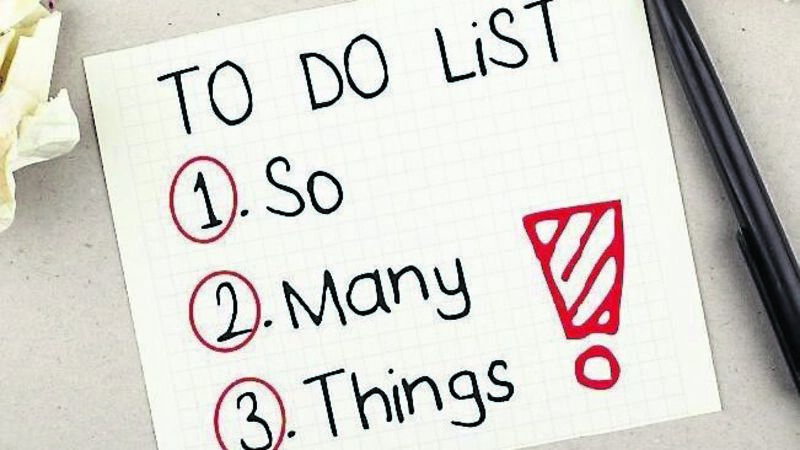Tips on dealing with work-related anxiety

Managing how you respond to the busier and more stressful situations at work is paramount for diffusing anxiety.
EXPERIENCING anxiety in day-to-day life is common in today’s world.
Anxiety can be overwhelming and hard to manage at times, particularly when it occurs in the workplace.
Trying to live up to the expectations we have of ourselves and the potential expectations of others, particularly in a professional setting, can be exhausting. And we often don’t recognise when we are taking our work home with us; ruminating and overthinking, causing even more anxiety and stress. Prolonged instances of your personal life being negatively impacted by work can take its toll on overall mental and physical health.
But luckily, there are ways to prevent this. By taking steps to slow down and regularly take stock of our work life and our feelings towards work, we can begin to create a new sense of balance and awareness. This can take time and practice, like any new skill, but you can begin to develop it as soon as you become open to the idea of change and reflection upon what is serving us well, and what is not.
You may find the below five tips useful for managing feelings of anxiety at work.
1. Acknowledge your anxiety
The first step to working on anxiety is acknowledging its presence. Don’t be afraid to admit you are feeling anxious or overwhelmed – it is not a sign of weakness.
Opening up about these feelings to yourself or to others won’t create a tsunami of more negative feelings, but it will actually have the opposite effect and is key to disempowering its impact and moving forward.
The concept of ‘pushing through’ is difficult to sustain, and can also lead to further negative feelings and isolation.
By slowing down and acknowledging your state of being, you can gain clarity about your own wants and needs and what truly matters in your life.
Reflect upon and consider things like how much time and energy you give to your job, and whether you’re doing unpaid overtime worrying about it outside of your contracted hours.
2. Practice self-care
Self-care – you may hear this phrase mentioned a lot, but what does it actually look like in practice? Well, we all care for others in our lives; ask them how they are doing or if they need anything, tell them to slow down and take time out when they are stressed, etc., but often we fail to provide ourselves with the same.
We can often lose sight of how we are doing in our daily lives until we have already reached a place of burnout. Practicing self-care can prevent this and help you to tune into how you are currently feeling before it is too late.
In work, it might be trying something as simple as taking a breather for a few minutes in the fresh air, eating your lunch slowly and away from your desk, tuning-out from thoughts relating to work or chatting to a colleague.
Outside of the workplace, it might involve putting more energy into eating, exercising and sleeping well, having a social life and checking in with friends and family, or taking some me- time every week to have a hot bath and watch a movie.
Ask yourself, what does a balanced lifestyle look like to you? If you don’t know the answer, then take some time to explore and write about this.
3. Separate tasks into more manageable steps
The reality is that there will always be work to do, but managing how you respond to the busier and more stressful situations at work is paramount for diffusing anxiety.
If you have a big project coming up, perhaps don’t dive in at the deep end and swim against the current of overwhelm, or you will tire very quickly.
Step back and take a moment to observe the challenge ahead, and decipher what the necessary steps are that need to be taken in order to achieve it.
Learn to have faith in your ability to work through it, and mentally break the project into smaller and more manageable tasks. If it feels like your Everest then consider getting to base camp, then camp one, and so on, and before you know it you will have reached that summit.
Write this down and prioritise and organise your workload in the simplest form to begin with, and then build on this foundation as you ease yourself into each task.
Check in with yourself and your progress as you go, and be sure to reflect and appreciate how far you have come.
4. Manage expectations and
set realistic goals
Becoming aware of where the pressure or cause of your anxiety comes from at work can be very helpful. If the pressure is coming from management and your workload is unsustainable, then consider your options and set realistic goals for yourself.
People often struggle to communicate that their workload is too large for fear of looking weak or incapable, and they continue to try and ‘push through’ at the serious expense of their wellbeing.
Try to find your voice and ask for a check-in with a manager before you have reached peak frustration.
Remind yourself that your job is a choice and not a demand, so try to remember your worth in that space.
On the other hand, if the pressure is coming from yourself and you are setting the bar of perfectionism too high, then, once again, it can be helpful to take a step back, take stock and work on taking down that bar entirely.
We often believe we are letting others down if we don’t work harder, but this is not true.
Try to simplify and work smarter – the quality and consistency of your work is going to vary, and you are going to make mistakes, because you are human and you are imperfect, just like everybody else, and that is okay.
5. Seek professional support
People attend their GP when they feel physically run-down or when they are due a check-up. This same mindset can and should apply to mental health – a mental health check-up or seeking support when we are feeling mentally run-down is a great way to manage anxiety and other negative feelings related to work.
Becoming aware of what is working well in your life and what is not is not always the easiest thing to do, so having a mental health professional advise you on what areas you may need support with and help you to develop coping skills in response to these can be incredibly worthwhile.
You can then take these new skills with you through the rest of both your personal and professional life, and feel more prepared for future challenges.
Author: Christine O’ Hea MIACP, Centric Mental Health
About Centric Mental Health: Centric Mental Health is Ireland’s largest provider of private mental health services, with clinic locations across Cork, Dublin, Kildare, Kilkenny, Louth and Wicklow, as well as a digital clinic that can be accessed from anywhere in Ireland. Working with adults, children, adolescents, couples and families nationwide, Centric Mental Health treat a range of mental health difficulties through their high quality, specialised mental health services. Find out more about Centric Mental Health here.







 App?
App?




